|
|
| |
■
『世界の英語教室 (小学校)[韓国編]
〜韓国の小学校英語教育・取材を終えて見えたこと〜』
English Education System at Elementary School in South-Korea
By Mina Hisada/Illustration by Puri/Photos by Hirotsugu Koshin & Mikio Shiga
◆
近くて遠い国から近くて近い国へ
(The changes of my heart toward South Korea)
| |

|
冬のソナタの舞台・春川
韓流ブームのきっかけとなった
|
今でこそ韓流ブームという言葉があるが、私が子供のころの韓国は近くて遠い国だった。
隣の国の人なのに、テレビで見ることはあっても なかなかじかに接することはなかった。初めて韓国の人と接したのは20歳を過ぎたころ、留学先のカナダでだった。クラスで最初に声をかけてくれたのが、ソウルから来たユンヒちゃんだったのだ。
(I was not familiar with South Korea when I was a child. This may strike you as odd, because it's so close to Japan, but I grew up with few Koreans around me and I seldom had a chance to even see a Korean except on TV. When I was in my early 20s, I went to Canada to study and that's where I made some Korean friends. Yuni, who came from Seoul, was the first person who talked to me in class.)
韓国の人と接するのは 正直ちょっぴり怖かった。メディアを通じて、いかに反日感情を持っている人が多いか知っていたからだ。でも、ユンヒちゃんにたくさんの韓国人を紹介してもらい、韓国料理を食べ、その文化や国民性の違いを知って、私は徐々に韓国に親近感を感じるようになっていった。そして、いつのまにか韓国人が集う教会に出入りし、片言の韓国語がしゃべれるようになっていった。
こうして、「近い国からホントに近い国」へと、私の中の韓国は変わっていった。
(At first, to be honest, I was afraid of her. I knew from the media that Koreans didn't like Japan very much. But Yuni was the reason I changed my mind. Being with her gave me so many chances to experience Korean culture - the food, the people, their religious beliefs, etc.)
| |
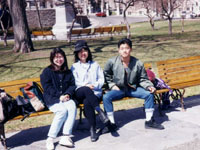
|
ユンヒちゃん(写真中央)を囲んで
筆者(左)と友人(右) ・ケベックシティにて
|
一般的に言って、日本人よりストレートで感情表現豊かな彼らは、人よりよく笑い、よく泣く、私にとってはむしろ気の合う人たちだった。彼らがよく口にする「ケンチャナヨ(大丈夫)」精神が大好きになった。
こうして、「近い国からホントに近い国」へと、私の中の韓国は変わっていった。
(This is a generalization, I know, but South Koreans tend to express their feelings much more directly than the Japanese. I felt comfortable being with South Koreans, more so than I would with Japanese people. I loved the way they said, "Ken chana yo" (That's OK).
◆
移民をする人の多さ(Emigration)
そんな韓国で英語教育が盛んなことは、いまや多くの人が知る事実となっている。
極端な例だろうけれど、中には発音をよくするために舌を手術するだとか、子供にアメリカの市民権をとらせるためにアメリカで出産をする人もいるらしい。「英語村」は特に有名だ。実は、日本にも「英語村」はあるのだが、あくまで企業レベルでやっていることであって、韓国のように国を挙げてではない。(「英語村」についてはPART6のコラム参照)
(It's well-known that South Koreans place a great deal of emphasis on learning English. There are stories of people having operations on their tongue to improve their English pronunciation, and some women would go to the States to give birth there so that their children can get U.S. citizenship.)
| |
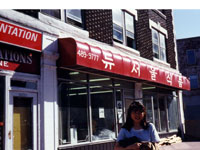
|
移民が経営する韓国食材店が多いカナダ
日本の食材もなんとかここで手に入る |
私が初めて知り合ったユンヒちゃんが紹介してくれた韓国人の多くは、現地・カナダに移住した移民だった。彼らは家族単位で移民しており、多くの家族がその街の韓国人コミュニティーを形成していた。韓国では移民をする人が日本より圧倒的に多い。この移民する人の多さと英語教育の熱心さというのが、まず日本とは違った英語熱の理由として挙げられるだろう。
(When I was in Canada, Yuni introduced me to so many Koreans. To my surprise, most of them were not temporary residents, like the Japanese there. They were immigrants. They emigrated from South Korea with family or even with relatives and became members of that country's Korean community. The rate of emigration is much higher than in Japan. This could be one of the reasons for their focus on English.)
| |

|
|
|
ギロギアッパは今日もがんばる
|
◆
学歴社会(An education-conscious society)
日本には「点取り虫」や「がり勉」といった、勉強だけに熱心な人に対する否定的な言葉があるが、韓国にはないという。歴史のひもをとけば、儒教からくる科挙の存在があり、武官よりも文官が中心という社会の仕組みがあったからだろう。現代でも、何より勉強の出来る人が尊敬される。社会的成功を目指すため、親は子供を小さいうちから英語の塾に通わせたり、英語圏の国へ母親同伴で留学させたりする。
(In Japanese, there are negative words for students whose only concern is studying and getting high scores. On the contrary, there are no such words in Korean. For a long time, Confucianism has played an important part in Korean society - and it's still the case. If you are an excellent student with excellent grades, then you'll be admired by all. That's why parents have their kids study at English schools from when they are very young and even let them live abroad to improve their English.)
余談になるが、最近では国内に残る「ギロギアッパ」(お父さん。語句の説明はPART6のコラム参照)との遠距離居住が原因となる離婚が社会問題になっている。
(There are some downsides to this. The incidence of divorce is increasing between girogi appa and mothers living abroad.)
| |
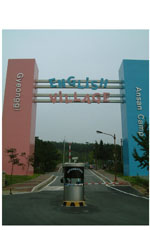
|
英語村・English Village in Ansan |
◆
国力と英語力 (Economic power and English)
1981年に、88年のオリンピック開催地が決定した。有力候補地として名古屋も挙げられていたが、結果的にソウルが選ばれた。同年、政府は都市部の小学校を中心に英語活動を促し、82年には特別活動の一環として英語活動を導入。オリンピックに備えて経済的にも国民の意識改革にも取り組み出した。そんな国民への意識改革の一つの手段が「英語」だった。
(In 1981, Seoul was chosen to host the 1984 Olympics. Nagoya was also a candidate that year, but the gods smiled on Seoul. The government immediately started various English education initiatives. English began being taught at some elementary schools in the big cities. The government tried to change the national consciousness for the Olympics, and one method of doing this was through English.)
1993年には「世界化」を国家戦略とし、メディアを通して、「産業化には失敗したが、情報化の面ではリードしよう」というスローガンを流した。経済的には1996年、OECDに加盟。実質的に先進国の仲間入りを果たす。だが翌年、IMF通貨危機に襲われ、多くの企業が倒産してしまった。
この2つの出来事−ソウルオリンピックとIMF通貨危機−が、韓国の人々の英語熱をあおる要因になったといわれている。歴史に「もし」はないのだが、もしオリンピック開催地としてソウルが選ばれていなかったら、これほどまでに英語熱が高まっただろうか。もし名古屋が選ばれていたら、今ごろ韓国社会はどのようになっていただろうかと、ふと思う。
(Globalization was the buzz word of 1993. "We lost out in industrialization, but not in information," was the message spread by the media. In 1996, South Korea joined the OECD and became officially recognized as an advanced country. However, the following year saw the IMF currency crisis and many companies went bankrupt. People say that the Olympics and the IMF crisis were the two triggers for the current intense focus on learning English. If Nagoya had been chosen instead of Seoul, what would South Korea be like now?)
| |
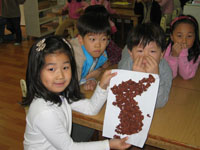
|
落ち葉で作った"My Country" |
◆
決断力(Making decisions)
「韓国人の気質」も英語熱の大きな要因になっているのではないだろうか。話合いを何度も重ね、石橋を叩いて渡る「慎重型」の日本人と違い、韓国人は一般的に決断を下すのが早く、「実行型」だといわれている。完ぺきに用意してから始める日本人と、出たとこ勝負の韓国人。英語教育の姿勢にもそれが現れていると思われる。ソウルオリンピックの開催が決まった翌年には、小学校で英語活動を行なわせるなどは、典型的な例だと思う。
(Perhaps the South Korean character can be seen in the speed with which South Korea implemented its English education initiatives. Generally, Japanese don't make decisions as quickly as South Koreans do. In Japan, all must be ready and perfect before embarking on a project. In South Korea, they tend to make decisions quickly and fine tune as they go. A good example of this is the way that, after Seoul was chosen to host the Olympics, they started teaching English at elementary schools the following year.)
また最近になって、2008年度から小学1年から英語教育を開始する計画が承諾された。
(In 2008, English will be taught from Grade 1.)
| |
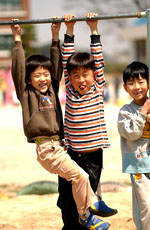
|
|
|
20年後はどんな世界になっているのかな
|
◆
政府の意気込み
まずは特定の地域から始めて、いずれは韓国中の6歳児が英語を習い始めることになるという。つまり、小学校入学と同時に母語と英語を習い始めるわけだ。母語と同時に英語を習うことで、母語習得への悪影響を心配する声もあがっている。一方で、外国語学習を行なうと、母語の力が伸びるという調査もあり、賛否両論。今のところ実験段階といったところだ。
(This initiative will start in some regions first, where children will start learning English at the age of six. They would learn it side by side with their mother tongue. Although some believe that learning a foreign language helps one master one's mother tongue, others worry that it will have a negative effect.)
うまくいくかどうかはともかく、私は韓国政府の意気込みを感じてならない。1993年の「世界化」宣言や、2001年に日本の文部科学省にあたる「教育部」(韓国では省庁を部という呼ぶ)を「教育人的資源部」へと名称変更したことも然り。
また、小学校英語の導入が決定すると同時に、大学での英語プログラムの抜本的見直しを断行するなど、その姿勢には政府の熱い思いや国民への決意が伝わってくるのである。
(I don't know whether this will succeed or not, but I do get a sense of the government's enthusiasm. For example: in 1993, they came up with the slogan "Globalization"; in 2001, they changed name of their Ministry of Education to the Ministry of Educational Human Resources"; and once they decided to incorporate English in elementary school education, they also decided to reform the English education system in universities. All these actions are in accord with the slogan, and it is a product of the will and enthusiasm of the South Korean people.)
|
韓国の小学生英語教育はこちら
(Click here!)
|
|
|









